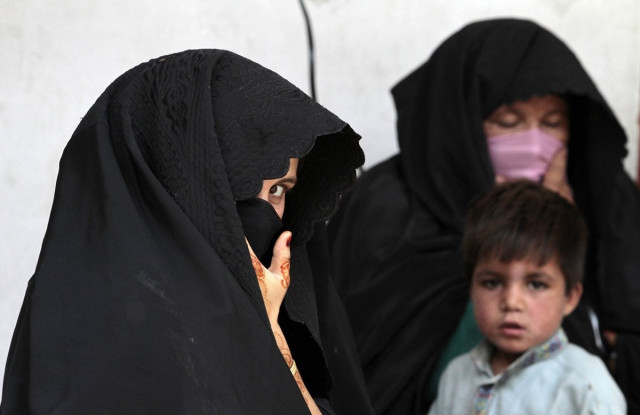UN says Pakistan has food 'emergency', but donors look elsewhere
Fifteen percent of children in Pakistan are severely malnourished, and some 40 percent suffer from stunted growth.

A woman sits with others while waiting her turn to receive fortified food supplements at a centre for malnourished women and children during a visit by the executive director of the WFP in Baidara in Swat valley. PHOTO: Reuters
Fighting in tribal areas bordering Afghanistan compounded problems caused by three consecutive years of floods that destroyed crops and forced millions of people to temporarily abandon their homes.
Although most have now returned, about half of Pakistan's population still does not have secure access to enough food, up from a little over a third a decade ago, the UN World Food Programme (WFP) said. Fifteen percent of children are severely malnourished, and some 40 percent suffer from stunted growth.
"This is an emergency situation, both from the food security side as well as from the malnutrition side," WFP chief Ertharin Cousin told Reuters. "We need to raise the alarm."
At a center for treating acute malnutrition in Swat Valley, visited by Cousin on Sunday, a young mother called Zainab clutched her underweight 2-month-old baby and waited for a high-nutrition food ration.
"When the area was evacuated, we left our cattle and our homes, when we came back our cattle were dead and our homes were destroyed," said Zainab, who wore a black burqa.
There is growing concern that international donors will lose interest in the unstable border areas after the withdrawal next year of US-led foreign forces from Afghanistan.
Already, Cousin said, the rising cost of the refugee crisis in Syria meant it was harder to attract funds to Pakistan.
WFP's Syria-related operations currently cost $19 million a month, and are forecast to rise as high as $42 million a month by the end of the year, putting a strain on Western donors.
North Korea is even worse hit by funding shortages, Cousin said, partly due to a drop in donations noticed at the beginning of this year, when Pyongyang threatened to launch a nuclear attack on the United States.
"We are significantly under-funded in DPRK going into this lean season, and we are very concerned about what that means," said Cousin, who called off a visit to North Korea during the tensions in March. She said she still planned to visit.













COMMENTS
Comments are moderated and generally will be posted if they are on-topic and not abusive.
For more information, please see our Comments FAQ